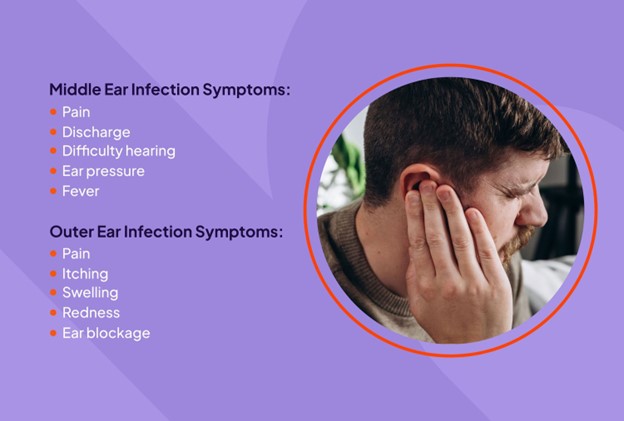Understanding Ear Health: Causes, Symptoms, and Effective Treatment Methods
Introduction
Ears play an essential role in our daily lives as they help us hear sounds and maintain balance. However, ear health is often overlooked until we experience discomfort or pain. In this blog post, we will discuss the common causes of ear issues, their symptoms, and effective treatment methods to ensure optimal ear health.
Causes of Ear Health Issues

1. Ear infections: Bacterial or viral infections can cause inflammation and fluid buildup in the middle ear, leading to pain and discomfort. These infections are more common in children due to their underdeveloped eustachian tubes.
2. Excessive noise exposure: Prolonged exposure to loud noises can damage hair cells within the inner ear, resulting in hearing loss or tinnitus (ringing in the ears).
3. Blockage of the ear canal: Wax buildup, foreign objects, or water trapped in the ear can cause blockages and lead to discomfort or infection.
4. Age-related hearing loss: As we age, our hearing naturally declines due to changes within the inner ear.
5. Eustachian tube dysfunction: The eustachian tubes connect the middle ear to the back of the throat and help maintain air pressure. When these become blocked or inflamed, it can lead to discomfort and potential infections.
6. Barotrauma: Rapid changes in air pressure, such as during air travel or diving, can cause damage to the inner ear.
7. Autoimmune disorders: Conditions like lupus or rheumatoid arthritis may affect ear health and function.
Symptoms of Ear Health Issues
1. Pain in the ear
2. Fluid draining from the ear
3. Hearing loss
4. Ringing, buzzing, or hissing sounds (tinnitus)
5. Dizziness or balance problems
6. Fullness or pressure within the ear
7. Itching or irritation in the ear canal
8. Recurrent ear infections
Step-by-Step Guide to Curing Ear Health Issues
1. Consult a healthcare professional: If you suspect an ear health issue, consult your doctor or an otolaryngologist (ear, nose, and throat specialist) for proper diagnosis and treatment.
2. Treat bacterial infections: Antibiotics may be prescribed to treat bacterial infections causing pain and inflammation within the middle ear. Over-the-counter pain relievers like ibuprofen or acetaminophen can help manage discomfort while the infection clears up.
3. Manage wax buildup: If you have excessive earwax, your doctor may recommend over-the-counter drops to soften and remove the wax or perform a minor procedure in their office to safely remove it. Avoid using cotton swabs or other objects to clean your ears as this can push wax further into the ear canal or cause injury.
4. Protect your hearing: Limit exposure to loud noises by wearing protective earmuffs or earplugs, and give your ears time to recover between exposures.
5. Treat autoimmune disorders: If an underlying autoimmune disorder is causing ear health issues, your doctor will prescribe medications or treatments to manage the condition.
6. Maintain overall health: A healthy lifestyle that includes a balanced diet, regular exercise, and stress management can contribute to better ear health and function.
7. Monitor changes in hearing: Regular hearing tests can help detect any changes in hearing ability and allow for early intervention if necessary.
8. Manage barotrauma: During air travel or diving, practice techniques like swallowing, yawning, or chewing gum to equalize ear pressure. If you experience severe pain or discomfort during these activities, consult a healthcare professional.
maintaining optimal hearing and balance. By understanding the common causes of ear issues, recognizing symptoms, and following effective treatment methods, we can ensure our ears remain healthy and functional throughout our lives. If you suspect an issue with your ear health, consult a healthcare professional for proper diagnosis and treatment.
Hello there, just became alert to your blog through Google,
and found that it is truly informative. I’m
gonna watch out for brussels. I will be grateful if you continue
this in future. Many people will be benefited from your writing.
Cheers! Lista escape roomów
Very interesting details you have observed, thank you
for putting up.!